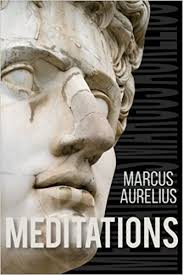Meditations Page #16
Meditations is a series of personal writings by Marcus Aurelius, Roman Emperor from 161 to 180 AD, recording his private notes to himself and ideas on Stoic philosophy. Marcus Aurelius wrote the 12 books of the Meditations in Koine Greek as a source for his own guidance and self-improvement.
XXXIII. Ever consider and think upon the world as being but one living substance, and having but one soul, and how all things in the world, are terminated into one sensitive power; and are done by one general motion as it were, and deliberation of that one soul; and how all things that are, concur in the cause of one another's being, and by what manner of connection and concatenation all things happen. XXXIV. What art thou, that better and divine part excepted, but as Epictetus said well, a wretched soul, appointed to carry a carcass up and down? XXXV. To suffer change can be no hurt; as no benefit it is, by change to attain to being. The age and time of the world is as it were a flood and swift current, consisting of the things that are brought to pass in the world. For as soon as anything hath appeared, and is passed away, another succeeds, and that also will presently out of sight. XXXVI. Whatsoever doth happen in the world, is, in the course of nature, as usual and ordinary as a rose in the spring, and fruit in summer. Of the same nature is sickness and death; slander, and lying in wait, and whatsoever else ordinarily doth unto fools use to be occasion either of joy or sorrow. That, whatsoever it is, that comes after, doth always very naturally, and as it were familiarly, follow upon that which was before. For thou must consider the things of the world, not as a loose independent number, consisting merely of necessary events; but as a discreet connection of things orderly and harmoniously disposed. There is then to be seen in the things of the world, not a bare succession, but an admirable correspondence and affinity. XXXVII. Let that of Heraclitus never be out of thy mind, that the death of earth, is water, and the death of water, is air; and the death of air, is fire; and so on the contrary. Remember him also who was ignorant whither the way did lead, and how that reason being the thing by which all things in the world are administered, and which men are continually and most inwardly conversant with: yet is the thing, which ordinarily they are most in opposition with, and how those things which daily happen among them, cease not daily to be strange unto them, and that we should not either speak, or do anything as men in their sleep, by opinion and bare imagination: for then we think we speak and do, and that we must not be as children, who follow their father's example; for best reason alleging their bare successive tradition from our forefathers we have received it. XXXVIII. Even as if any of the gods should tell thee, Thou shalt certainly die to-morrow, or next day, thou wouldst not, except thou wert extremely base and pusillanimous, take it for a great benefit, rather to die the next day after, than to-morrow; (for alas, what is the difference!) so, for the same reason, think it no great matter to die rather many years after, than the very next day. XXXIX. Let it be thy perpetual meditation, how many physicians who once looked so grim, and so theatrically shrunk their brows upon their patients, are dead and gone themselves. How many astrologers, after that in great ostentation they had foretold the death of some others, how many philosophers after so many elaborate tracts and volumes concerning either mortality or immortality; how many brave captains and commanders, after the death and slaughter of so many; how many kings and tyrants, after they had with such horror and insolency abused their power upon men's lives, as though themselves had been immortal; how many, that I may so speak, whole cities both men and towns: Helice, Pompeii, Herculaneum, and others innumerable are dead and gone. Run them over also, whom thou thyself, one after another, hast known in thy time to drop away. Such and such a one took care of such and such a one's burial, and soon after was buried himself. So one, so another: and all things in a short time. For herein lieth all indeed, ever to look upon all worldly things, as things for their continuance, that are but for a day: and for their worth, most vile, and contemptible, as for example, What is man? That which but the other day when he was conceived was vile snivel; and within few days shall be either an embalmed carcass, or mere ashes. Thus must thou according to truth and nature, throughly consider how man's life is but for a very moment of time, and so depart meek and contented: even as if a ripe olive falling should praise the ground that bare her, and give thanks to the tree that begat her. XL. Thou must be like a promontory of the sea, against which though the waves beat continually, yet it both itself stands, and about it are those swelling waves stilled and quieted. XLI. Oh, wretched I, to whom this mischance is happened! nay, happy I, to whom this thing being happened, I can continue without grief; neither wounded by that which is present, nor in fear of that which is to come. For as for this, it might have happened unto any man, but any man having such a thing befallen him, could not have continued without grief. Why then should that rather be an unhappiness, than this a happiness? But however, canst thou, O man! term that unhappiness, which is no mischance to the nature of man I Canst thou think that a mischance to the nature of man, which is not contrary to the end and will of his nature? What then hast thou learned is the will of man's nature? Doth that then which hath happened unto thee, hinder thee from being just? or magnanimous? or temperate? or wise? or circumspect? or true? or modest? or free? or from anything else of all those things in the present enjoying and possession whereof the nature of man, (as then enjoying all that is proper unto her,) is fully satisfied? Now to conclude; upon all occasion of sorrow remember henceforth to make use of this dogma, that whatsoever it is that hath happened unto thee, is in very deed no such thing of itself, as a misfortune; but that to bear it generously, is certainly great happiness. XLII. It is but an ordinary coarse one, yet it is a good effectual remedy against the fear of death, for a man to consider in his mind the examples of such, who greedily and covetously (as it were) did for a long time enjoy their lives. What have they got more, than they whose deaths have been untimely? Are not they themselves dead at the last? as Cadiciant's, Fabius, Julianus Lepidus, or any other who in their lifetime having buried many, were at the last buried themselves. The whole space of any man's life, is but little; and as little as it is, with what troubles, with what manner of dispositions, and in the society of how wretched a body must it be passed! Let it be therefore unto thee altogether as a matter of indifferency. For if thou shalt look backward; behold, what an infinite chaos of time doth present itself unto thee; and as infinite a chaos, if thou shalt look forward. In that which is so infinite, what difference can there be between that which liveth but three days, and that which liveth three ages?
Translation
Translate and read this book in other languages:
Select another language:
- - Select -
- 简体中文 (Chinese - Simplified)
- 繁體中文 (Chinese - Traditional)
- Español (Spanish)
- Esperanto (Esperanto)
- 日本語 (Japanese)
- Português (Portuguese)
- Deutsch (German)
- العربية (Arabic)
- Français (French)
- Русский (Russian)
- ಕನ್ನಡ (Kannada)
- 한국어 (Korean)
- עברית (Hebrew)
- Gaeilge (Irish)
- Українська (Ukrainian)
- اردو (Urdu)
- Magyar (Hungarian)
- मानक हिन्दी (Hindi)
- Indonesia (Indonesian)
- Italiano (Italian)
- தமிழ் (Tamil)
- Türkçe (Turkish)
- తెలుగు (Telugu)
- ภาษาไทย (Thai)
- Tiếng Việt (Vietnamese)
- Čeština (Czech)
- Polski (Polish)
- Bahasa Indonesia (Indonesian)
- Românește (Romanian)
- Nederlands (Dutch)
- Ελληνικά (Greek)
- Latinum (Latin)
- Svenska (Swedish)
- Dansk (Danish)
- Suomi (Finnish)
- فارسی (Persian)
- ייִדיש (Yiddish)
- հայերեն (Armenian)
- Norsk (Norwegian)
- English (English)
Citation
Use the citation below to add this book to your bibliography:
Style:MLAChicagoAPA
"Meditations Books." Literature.com. STANDS4 LLC, 2025. Web. 24 Feb. 2025. <https://www.literature.com/book/meditations_76>.








Discuss this Meditations book with the community:
Report Comment
We're doing our best to make sure our content is useful, accurate and safe.
If by any chance you spot an inappropriate comment while navigating through our website please use this form to let us know, and we'll take care of it shortly.
Attachment
You need to be logged in to favorite.
Log In